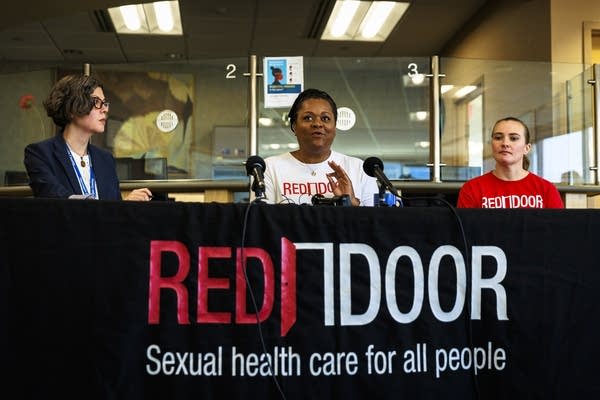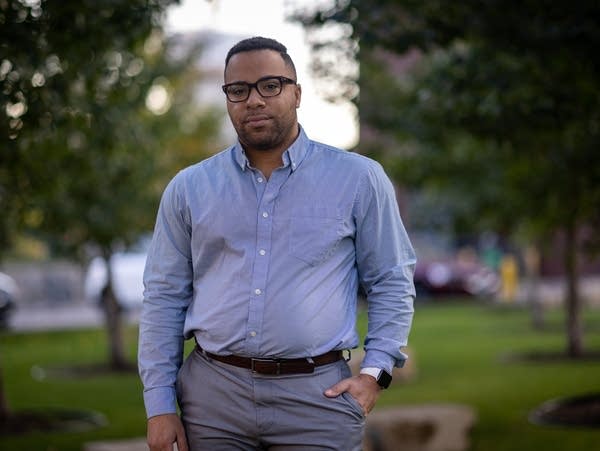Effort ramps up to reduce disparities in monkeypox treatment, vaccines

Go Deeper.
Create an account or log in to save stories.
Like this?
Thanks for liking this story! We have added it to a list of your favorite stories.
One day in July, Derek Johnson-Dean’s phone was ringing off the hook. The former public health communicator was fielding numerous calls from former clients and old friends.
“The topic was always the same. There was some crisis or some worry about monkeypox, and they needed to get assistance,” he said.
The virus was spreading around the world, including in the U.S., with outbreaks particularly bad in the LGBTQ community — particularly among men who have sex with men. And at the time, information was scant. So Johnson-Dean, who previously worked in public health education at Red Door Clinic and other places, started making calls of his own.
“Physicians that I've worked with, case managers, just people in the field,” he said.
Turn Up Your Support
MPR News helps you turn down the noise and build shared understanding. Turn up your support for this public resource and keep trusted journalism accessible to all.
Johnson-Dean used his network, and started compiling all the information he found onto a website, and launched the Minneapolis Monkeypox Taskforce. He did training sessions with some groups, and where there was a need, Johnson-Dean worked to fill it.
Like when he found out that the state health department wouldn’t be at Duluth Pride to do outreach around the virus in early September, so the taskforce bought one. Johnson-Dean drove up, along with his husband, Tim, to work the table and provide information about monkeypox treatment and vaccine availability.
While monkeypox cases are still going up nationwide, a recent report from the Centers for Disease Control and Prevention shows that its growth has slowed after peaking in August. A trend health officials expect to continue.
Still, the report found that out of more than 100,000 specimens tested, there was a 28.6 percent positivity rate for monkeypox as of Sept. 21, and said that the U.S. is unlikely to eradicate monkeypox entirely.
“We see that it took us about two months to get 100 cases [and] it took about a month to get to 200 cases,” said Luisa Pessoa-Brandao, director of public health initiatives at the Minneapolis Health Department. “So we definitely had a very steep increase.”
That means the work of public health officials and advocates continues.

Significant disparities in infections and response
At a recent forum, coordinated by the Minneapolis Monkeypox Taskforce, Pessoa-Brandao noted that while many people have been vaccinated for the virus, there are still gaps.
“We need to be careful to say that we're getting it under control, because it might be under control [in] the overall picture. But in certain communities, it may not be exactly under control,” she said. “Numbers are coming down. But there's significant disparities.”
While half of all monkeypox cases in the state have been among white people, they’re disproportionately high among Minnesotans of color. According to data from the state health department, 18 percent are among Black people, and 20 percent among Hispanic people.
Despite that, vaccine uptake among communities of color has been lower overall. At the Red Door Clinic in Minneapolis, they’ve seen this disparity up close. Of the 5,596 total monkeypox vaccinations the clinic has provided, as of Oct. 4, only 7.2 percent were given to Black/African American non-Hispanic people, and 9.8 percent to those who identify as Hispanic.
Advocates say the best way to address these disparities is building trust and relationships within these communities, something that’s not necessarily easy to do during a pandemic.
“COVID-19 showcased the need for that. And monkeypox has exacerbated the urgency to go ahead and get that started,” said Patrick Ingram, community health specialist at the Red Door. “And I'm talking about organizations that aren't just related to sexual health. These can be restaurants, barber shops, businesses and services, health and beauty. I mean, there's just so much intersectionality within one's own experience, and how public health can be leveraged in that.”

One route Ingram and his colleagues have taken is being proactive, reaching out to people at higher risk of infection with HIV and monkeypox to educate them and let them know when they’re eligible for the vaccine.
Ingram says in situations like these, the work of everyone — including community-grown organizations like the Minneapolis Monkeypox Taskforce — helps.
“One of the things is that, especially as a Black gay man living with HIV who has struggled with healthcare, it takes a village,” he said. “It takes a village to get into care, it takes a village to really remain in care. But it also takes a village to navigate public health emergencies. It is not just uniquely siloed for public health to solely be responsible for that, in my opinion, I think it takes community as well.”
Pessoa-Brandao says, in some ways, organizations like the taskforce can sometimes have more flexibility than governmental organizations to really address the need as they see it.
For Derek Johnson-Dean, that means continuing to fill gaps and provide outreach. He’s also working on an event that’s specifically dedicated to addressing disparities in monkeypox treatment.



